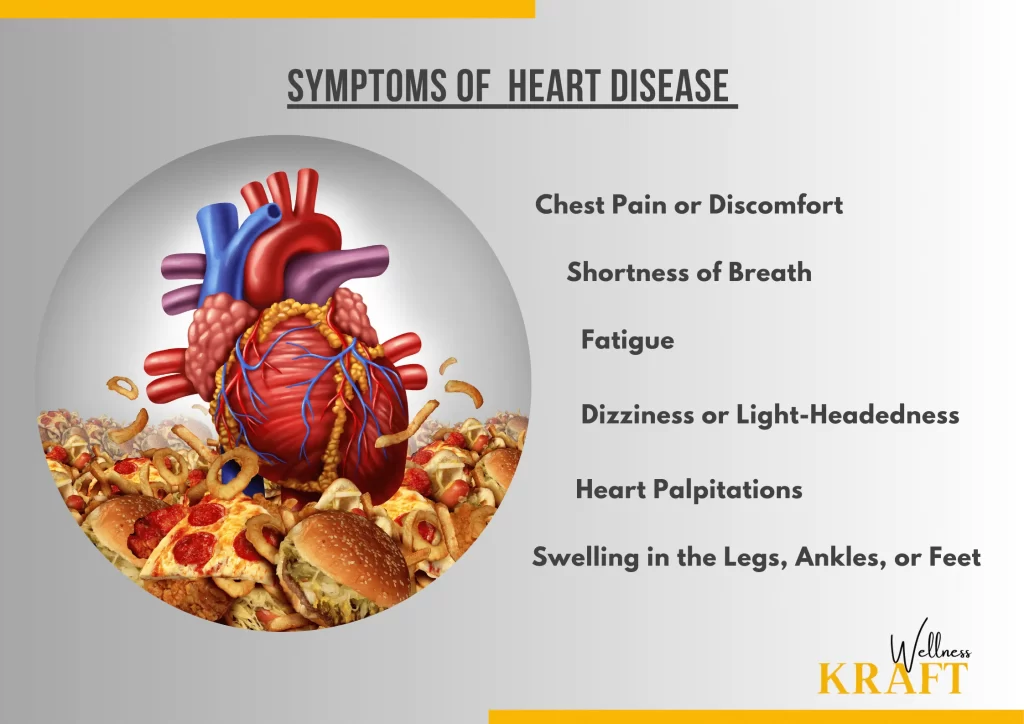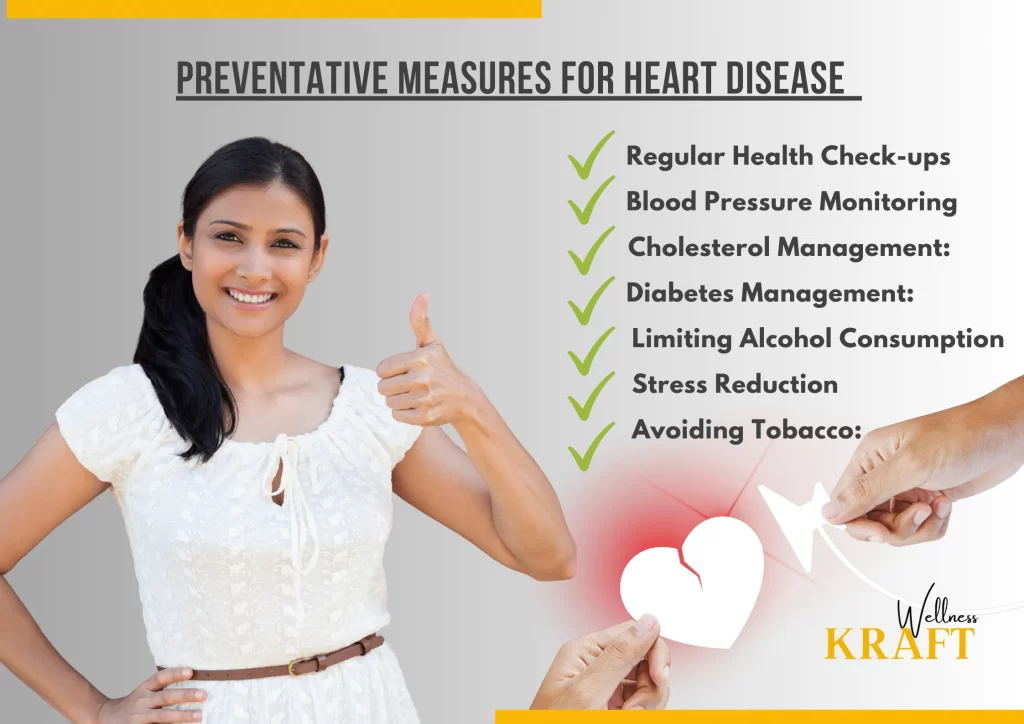“The heart acts as the body’s central processing unit, powering every other organ. It’s vital to one’s well-being.” – Wellness Kraft
Introduction
As women, we often prioritize the health and well-being of others before our own. However, when it comes to heart health, it’s important to take proactive steps to maintain a healthy heart. Understanding risk factors, symptoms, and preventative strategies for heart disease, the top cause of mortality for women in the US, is crucial. In this comprehensive guide, we’ll provide you with the information you need to maintain a healthy heart as a woman. From understanding the risk factors and symptoms of heart disease to adopting a heart-healthy lifestyle and exploring medical treatments, we’ll cover everything you need to know to prioritize your heart health. So let’s dive in and learn how to maintain a healthy heart as a woman.
Table of Contents
Understanding the Risk Factors for Heart Disease
Heart disease is a serious condition that can affect anyone, regardless of age, gender, or lifestyle. However, certain risk factors can increase your chances of developing heart disease. By understanding these risk factors, you can take proactive steps to reduce your risk and maintain a healthy heart.
Common Heart Disease Risk Factors Include

Smoking:
Smoking can damage the lining of your arteries and increase your risk of developing atherosclerosis (hardening of the arteries), which can lead to heart disease.
High blood pressure:
High blood pressure can damage your arteries and increase your risk of heart disease.
High cholesterol:
High levels of LDL (bad) cholesterol in your blood can cause plaque to build up in your arteries, increasing your risk of heart disease.
Diabetes:
Diabetes damages blood arteries and increases heart disease risk.
Obesity:
Being overweight or obese can increase your risk of developing heart disease.
Family history:
If a close family member has had heart disease, you may be at a higher risk.
Age:
As you get older, your risk of developing heart disease increases.
Other risk factors include physical inactivity, stress, and poor diet. By identifying your risk factors, you can take steps to reduce your risk and maintain a healthy heart.
Symptoms of Heart Disease:

Recognizing the symptoms of heart disease is crucial to seeking timely medical attention and preventing serious complications. While some symptoms may be mild or subtle, others can be severe and require immediate medical attention. Here are some common symptoms of heart disease to watch out for:
Chest pain or discomfort:
This is the most common symptom of heart disease and can feel like pressure, tightness, or squeezing in the chest. Pain may fluctuate or persist.
Shortness of breath:
If you’re having trouble breathing or feel like you can’t catch your breath, it could be a sign of heart disease.
Fatigue:
Feeling tired or weak, even after rest, can be a symptom of heart disease.
Dizziness or light-headedness:
If you feel like you’re going to faint or pass out, it could be a sign of heart disease.
Heart palpitations:
This refers to an irregular or rapid heartbeat that can feel like your heart is skipping a beat or fluttering.
Swelling in the legs, ankles, or feet:
This can be a sign of heart failure, a serious complication of heart disease.
It’s important to note that some people with heart disease may not experience any symptoms, especially in the early stages of the disease. That’s why regular check-ups and screenings are essential for maintaining heart health.
Adopting a Healthy-Heart Lifestyle

Adopting a heart-healthy lifestyle is one of the most effective ways to reduce your risk of heart disease. By making simple changes to your daily habits, you can improve your heart health and prevent serious complications. Here are some key steps you can take:
a. Quit Smoking:
If you’re a smoker, quitting smoking is one of the best things you can do for your heart health. Smoking damages the lining of your arteries, leading to atherosclerosis and increasing your risk of heart disease.
b. Maintain a Healthy Weight:
Being overweight or obese can increase your risk of developing heart disease. By maintaining a healthy weight through a balanced diet and regular exercise, you can reduce your risk.
c. Exercise Regularly:
Regular physical activity can improve your heart health and reduce your risk of heart disease. Aim for at least 30 minutes of moderate exercise, such as brisk walking or cycling, most days of the week.
d. Eat a Balanced Diet:
A healthy diet that’s low in saturated and trans fats, cholesterol, and sodium can improve your heart health. Focus on eating plenty of fruits, vegetables, whole grains, lean protein, and healthy fats.
e. Manage Stress:
Chronic stress can have a negative impact on your heart health. To manage stress, try relaxation techniques such as deep breathing, meditation, or yoga.
f. Get Enough Sleep:
Lack of sleep can increase your risk of heart disease. Aim for 7-8 hours of sleep per night to maintain good heart health.
In addition to adopting a heart-healthy lifestyle, it’s important to understand medical treatments for heart disease. In the next section, we’ll discuss some of the most common treatments for heart disease.
Medical Treatments for Heart Disease

If you have been diagnosed with heart disease, there are several medical treatments that can help manage your symptoms and reduce your risk of complications. The most common treatments for heart disease include:
a. Medications:
Medications are often prescribed to manage symptoms and prevent complications of heart disease. Common medications include blood thinners, ACE inhibitors, beta-blockers, and cholesterol-lowering drugs.
b. Angioplasty and Stenting:
Angioplasty and stenting are minimally invasive procedures used to treat blocked or narrowed arteries. During angioplasty, a small balloon is inflated inside the artery to open it up, and a stent is usually placed to keep the artery open.
c. Coronary Artery Bypass Grafting (CABG):
CABG is a surgical procedure that involves creating a new route for blood flow around blocked or narrowed arteries. During the procedure, a healthy blood vessel is taken from another part of the body and grafted onto the blocked artery.
d. Heart Valve Surgery:
Heart valve surgery is a procedure to repair or replace damaged heart valves. It’s typically done to treat conditions such as valve stenosis or regurgitation.
e. Cardiac Rehabilitation:
Cardiac rehabilitation is a structured program of exercise, education, and support designed to help people with heart disease improve their overall health and well-being.
It’s important to discuss your treatment options with your healthcare provider to determine the best course of action for your specific situation. In addition to medical treatments, lifestyle changes such as adopting a heart-healthy diet and regular exercise can also help manage symptoms and reduce your risk of complications.
Preventative Measures for Heart Disease

Preventing heart disease is key to maintaining good heart health. Here are some preventative measures you can take to reduce your risk of heart disease:
a. Regular Health Check-ups:
Regular health check-ups can help identify risk factors for heart disease and allow for early intervention to prevent complications.
b. Blood Pressure Monitoring:
High blood pressure is a major risk factor for heart disease. Managing your blood pressure with lifestyle modifications or medication can lower your risk.
c. Cholesterol Management:
High cholesterol levels can contribute to the development of atherosclerosis and increase your risk of heart disease. Managing your cholesterol through diet and medication can help reduce your risk.
d. Diabetes Management:
Diabetes can increase your risk of developing heart disease. Managing your blood sugar levels through diet, exercise, and medication can help reduce your risk.
e. Stress Reduction:
Chronic stress can have a negative impact on your heart health. Taking steps to manage stress through relaxation techniques, exercise, or therapy can help reduce your risk.
f. Limiting Alcohol Consumption:
Excessive alcohol consumption can contribute to high blood pressure, heart failure, and other heart-related problems. Limiting your alcohol intake to moderate levels can reduce your risk.
g. Avoiding Tobacco:
Smoking and exposure to second-hand smoke can damage your heart and increase your risk of heart disease. Avoiding tobacco use altogether is the best way to reduce your risk.
By implementing these preventative measures, you can reduce your risk of developing heart disease and maintain good heart health. Remember to discuss any concerns with your healthcare provider and make any necessary lifestyle changes to keep your heart healthy.
Women at Higher Risk for Heart Disease

While heart disease can affect women of all ages and backgrounds, there are certain factors that can increase a woman’s risk of developing heart disease. These include:
a. Age:
As women age, their risk of developing heart disease increases. Women over 55 years of age are at higher risk.
b. Family History:
A family history of heart disease can increase a woman’s risk of developing the condition.
c. High Blood Pressure:
Women with high blood pressure are at increased risk of developing heart disease.
d. High Cholesterol:
Women with high cholesterol levels are at increased risk of developing heart disease.
e. Smoking:
Smoking is a major risk factor for heart disease, and women who smoke are at higher risk than non-smokers.
f. Diabetes:
Women with diabetes are at increased risk of developing heart disease.
g. Obesity:
Women who are overweight or obese are at increased risk of developing heart disease.
h. Sedentary Lifestyle:
Lack of regular physical activity can increase a woman’s risk of developing heart disease.
i. Menopause:
Women who have gone through menopause are at increased risk of developing heart disease.
It’s important for women with these risk factors to take preventative measures to reduce their risk of heart disease. This includes maintaining a healthy lifestyle, getting regular check-ups, and managing any existing health conditions. By taking these steps, women can reduce their risk of heart disease and maintain good heart health.
Research Analysis
Over the years, there has been an increasing amount of research on heart disease in women. This research has helped shed light on the unique ways in which heart disease can affect women, as well as the risk factors and preventative measures specific to women.
One study published in the Journal of the American Heart Association found that women who experienced pregnancy complications, such as gestational diabetes or preeclampsia, had a higher risk of developing heart disease later in life. Another study published in the Journal of the American College of Cardiology found that women who experience menopause earlier in life may be at increased risk of developing heart disease.
In addition, the American Heart Association has published guidelines specifically for the prevention and management of heart disease in women. These guidelines highlight the importance of taking a holistic approach to heart health, including addressing lifestyle factors such as diet and exercise, as well as managing any existing health conditions.
Overall, the research on heart disease in women continues to evolve and inform our understanding of this condition. By staying up-to-date on the latest research and guidelines, healthcare providers can provide better care for women at risk for heart disease.
Natural and Medical Remedies for Heart Disease in Women
There are several natural and medical remedies that can help manage and prevent heart disease in women.
Natural remedies:
a. Healthy Diet:
Eating a balanced diet that is rich in fruits, vegetables, whole grains, and lean protein can help reduce the risk of heart disease.
b. Regular Exercise:
Regular physical activity can improve heart health by reducing blood pressure, cholesterol levels, and stress.
c. Stress Reduction:
Stress can contribute to the development of heart disease, so practicing stress-reducing techniques such as yoga or meditation can be beneficial.
d. Weight Management:
Maintaining a healthy weight can help reduce the risk of heart disease.
e. Supplements:
Some natural supplements, such as omega-3 fatty acids and garlic, have been shown to have a positive effect on heart health.
Medical remedies:
a. Medications:
Certain medications, such as statins and blood pressure medications, can help manage and prevent heart disease.
b. Medical Procedures:
In some cases, medical procedures such as angioplasty or bypass surgery may be necessary to treat heart disease.
c. Cardiac Rehabilitation:
This program involves exercise, education, and counselling to help individuals with heart disease manage their condition and improve their overall health.
It’s important to note that while natural remedies can be helpful, they should not be used as a substitute for medical treatment. Women with heart disease should work closely with their healthcare providers to determine the best course of treatment for their individual needs.
Concluding Thoughts
In conclusion, maintaining a healthy heart is crucial for women to lead happy and fulfilling life. At Wellness Kraft, we understand the importance of heart health and provide comprehensive resources and information to help women take control of their heart health.
Through our educational programs, healthy meal plans, and fitness resources, we strive to empower women to make informed decisions about their heart health and adopt a heart-healthy lifestyle.
By working closely with healthcare providers and staying up-to-date on the latest research and guidelines for heart disease in women, we aim to provide the highest quality of care for our clients and help them achieve optimal heart health.
We believe that every woman has the potential to improve their heart health and reduce their risk of heart disease, and we are committed to supporting them on their wellness journey.
Together, we can make a positive impact on women’s heart health and improve their overall wellness and quality of life.
Key Takeaways
1.Heart disease is a serious condition that affects millions of women worldwide.
2.Women can reduce their risk of heart disease by understanding the risk factors, recognizing the symptoms, and adopting a heart-healthy lifestyle.
3.A heart-healthy lifestyle includes eating a healthy diet, getting regular exercise, managing stress, maintaining a healthy weight, and working closely with healthcare providers.
4.Staying up-to-date on the latest research and guidelines for heart disease in women is important for better care and management of the condition.
5.Wellness Kraft provides comprehensive resources and information to help women take control of their heart health, including educational programs, healthy meal plans, and fitness resources.
6.Working closely with healthcare providers and making informed decisions about heart health can improve overall wellness and reduce the risk of heart disease.
7.Every woman has the potential to improve their heart health and reduce their risk of heart disease, and support is available to help them achieve their goals.
FAQs
1.What are the heart disease risk factors for women?
Some common risk factors for heart disease in women include high blood pressure, high cholesterol, diabetes, obesity, smoking, and a family history of heart disease.
2.How can women recognize the symptoms of heart disease?
Symptoms of heart disease in women can include chest pain or discomfort, shortness of breath, fatigue, nausea, and light-headedness. However, some women may experience different symptoms or no symptoms at all, which is why regular check-ups with a healthcare provider are important.
3.What are some heart-healthy foods that women should include in their diet?
Foods that are rich in fiber, omega-3 fatty acids, and antioxidants can all promote heart health. Some examples include leafy greens, berries, salmon, nuts and seeds, whole grains, and legumes.
4.How much exercise should women get to maintain a healthy heart?
For overall heart health, the American Heart Association advises engaging in at least 150 minutes of moderate-intensity exercise every week. This can be broken down into 30 minutes of activity per day, five days per week.
5.What are some effective ways to manage stress for better heart health?
Stress can contribute to heart disease, so managing stress is an important part of maintaining heart health. Some effective strategies include exercise, mindfulness and meditation, deep breathing exercises, and spending time with loved ones.
6.Can women prevent heart disease even if they have a family history of the condition?
While having a family history of heart disease can increase a woman’s risk, it is still possible to prevent heart disease through lifestyle changes such as healthy eating, regular exercise, stress management, and avoiding smoking.
7.What types of medical tests are recommended for women to assess their heart health?
Tests such as a blood pressure check, cholesterol screening, electrocardiogram (ECG), and stress test may be recommended by a healthcare provider to assess heart health in women.
8.Are there any natural remedies or supplements that can help prevent heart disease?
Some natural remedies and supplements, such as garlic, omega-3 fatty acids, and CoQ10, may have potential heart health benefits. However, it is important to speak with a healthcare provider before starting any new supplements or remedies.
9.What are some common medical treatments for heart disease in women?
Common medical treatments for heart disease in women may include medications such as statins or blood pressure medications, procedures such as angioplasty or stenting, or surgery such as coronary artery bypass grafting (CABG).
10.How can women work with their healthcare providers to improve their heart health and reduce their risk of heart disease?
Women can work with their healthcare providers to assess their risk for heart disease, develop a personalized plan for heart health, and regularly monitor and manage any existing conditions. It is important to communicate openly with healthcare providers and be proactive about heart health.









